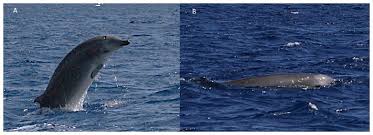A rare True’s Beaked Whale’s breach caught on camera

In this world there are hundreds of different types of species of hundreds of thousands of different animals, marine life, insects, etc. But in a 2013 video, published by a group of researchers on Tuesday, March 14, 2017, is the first evidence of True’s Beaked Whales.
True’s Beaked Whales, ever heard of them? Well, they are a rare species of beaked whale, found in temperate water of the North Atlantic to Brazil, South Africa, Mozambique, Australia and New Zealand. Not many people know they even exist, but a 2013 video is the first revealing the existence of these beaked whales, shot in Azores, a Portuguese Archipelago in the Atlantic Ocean.
The researchers, published their video result in the journal PeerJ, thus providing researchers across the world a glimpse of the behavior and social lives of these Beaked Whales.
True’s Beaked Whales are some of the least understood mammals on the planet,and spend approximately ninety percent of their time diving underwater. They live in small groups, rarely breach (go to the surface), and tend to stay away from human interaction.
Their bodies have special pockets for their fins when they dive, making their bodies smoother and allow the whales to conserve energy and oxygen.
“And when they breach, their show isn’t as charismatic as that of a dolphin’s. They just come, make a small blow, and you don’t see them again,” said Natacha Aguilar de Soto, a biologist at the University of St. Andrews in Scotland and the University of la Laguna in the Canary Islands in an interview with The New York Times.
The coloring of True’s Beaked Whales can sometimes vary within and between the species and even between the living and dead. True’s Beaked Whales possess such a mystery to researchers that they must get a reference from other whale species to help determine genetic and biological differences between new found species and already known species.
The beaked whales hung out around a researcher’s boat for ten minutes, breathing every ten seconds or so, giving the group of researcher time to video the encounter. The encounter with these beaked whales was among the five confirmed sightings of True’s Beaked Whales in the Atlantic archipelagos called Micronesia.
“I think it’s important to remember the beauty of the mysteries that are still in the ocean and hope that we should take care for them,” said Dr. Aguilar de Soto.
By reference the DNA of True’s Beaked Whales, many whale species like the El Hierro, a masked whale, having a similar genetic signature closest to True’s Beaked Whales.
“They are walking the rope of the physiological limitations, and this makes beaked whales more vulnerable to human impact than other whales,” Dr. Aguilar de Soto said.
In some occasions such as naval exercises, many whales can become stranded, whose fragile physiology is disturbed when they try to escape.
True’s Beaked Whales, are just one of the many creature in our world that confirm that there is much more to discover in our world, either through comparing DNA or going out into the field and seeing for ourselves, creatures, mammals and life forms we never knew existed will begin to shed light into our world.

I am a senior at NHS. I want to be a microbiologist or a biomedical engineer. I am taking this class because I enjoy writing and researching real time...







